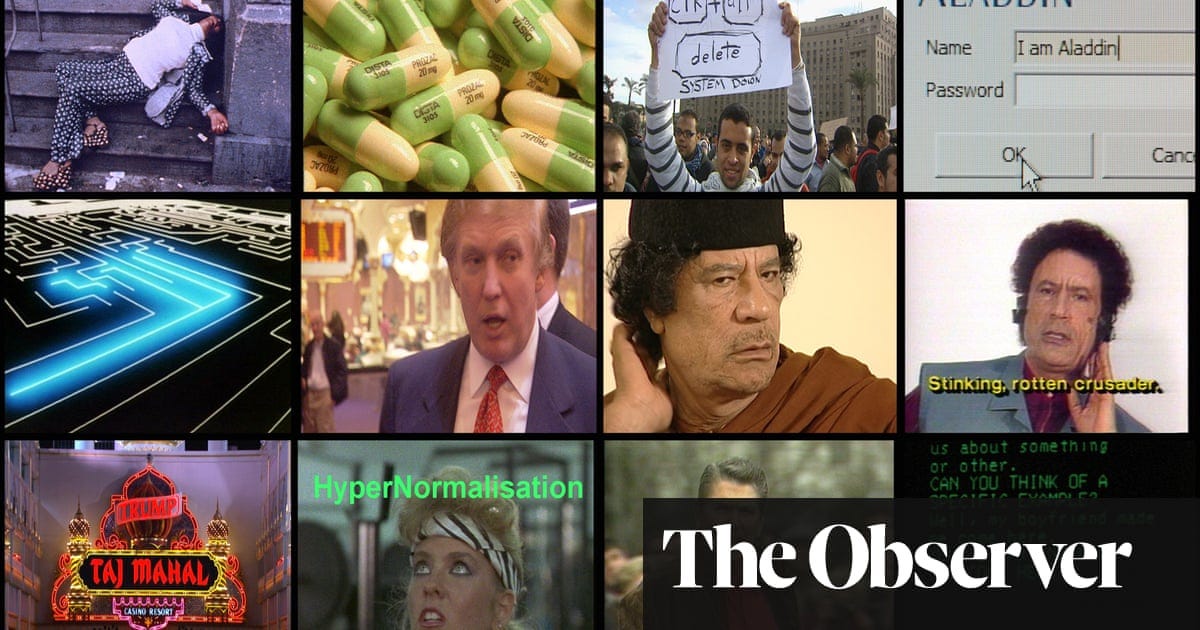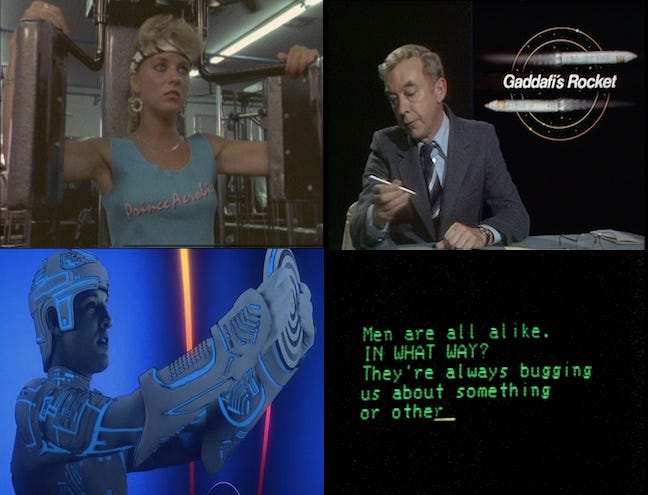#8: Hypercovidisation
Go look at some Coronavirus dashboards
Disclaimer: This largely speculative newsletter is not fact-checked. If you notice any errors, let me know.
We recently watched the 2016 BBC film Hypernormalisation, which is a strange movie that’s unlike any recent mainstream documentary. It’s not very dense with information, and I can only describe it as a meditative, impressionistic history of the last 30 years—in which Muammar Gaddafi plays a weirdly, but entertainingly, central role. No one screenshot captures the film, so here are collages some have assembled:
As you can see, the film is worth a watch for the spectacular archival footage alone.
But why are we talking about this now? Because it helps explain what’s happening now.
The film’s thesis is this: since the 1980’s, political and corporate elites have attempted to replace sociopolitical reality with a kind of virtual simulation—turning political and social questions into problems to be managed by a technocrats. This isn’t just about computers (thought they play a big part), but about a new way that the world’s elite sees its role in the world. This is a situation where “politics” is a dirty word, and buzzwords like “big data” and “smart governance” come to seem like solutions. If you’ve ever listened to a venture capitalist speak (example), you know this is true, and how stupid it can all sound.
It’s not a new idea. Francis Fukuyama described a similar transformation in the early 1990s, when he proclaimed the “end of history.” With every new crisis, people ridicule Fukuyama. See, history hasn’t ended!
But let’s say he’s describing not the literal “end” of history, but an attempt to make history seem over. Take this passage near the end of his The End of History and the Last Man:
The end of history will be a very sad time. The struggle for recognition, the willingness to risk one’s life for a purely abstract goal, the worldwide ideological struggle that called forth daring, courage, imagination, and idealism, will be replaced by economic calculation, the endless solving of technical problems, environmental concerns, and the satisfaction of sophisticated consumer demands.
It’s clear that management has become the paradigm for governance today. America’s foreign wars: managed, not fought. Climate change: managed, not prevented (we’ll see how that works out, lol). Culture itself, by endlessly embattled for-profit platforms: managed. Even when rabid conservatives criticized Obama’s taciturn foreign policy, they called it “managed decline.”
Ultimately, what Hypernormalisation shows is that the attempt to replace history with management is hollow. Politics is still going on. The unpredictable world continues, and eventually it escapes the grasp of technocratic attempts to model and manage it.
That is exactly what we are seeing now. I’ve talked a lot about the now-disavowed “don’t wear masks” guideline, which is only one example of technocratic failure in this crisis—the failure to coherently “manage” what is unfolding.
It’s only one of the reasons why there is, at this time, very little trust in a shared model of what goes on. Even governments, invested in the vision of a managed world, keep accusing one another of faking numbers; rather than any kind of global management, sovereign states engage in a comical competition for supplies. When the US somehow appropriated masks headed for Germany, a German official accused them of “piracy.”
In the initial fog of the crisis, the press made much of Trump’s ignoring “experts.” That critique has gradually dissipated amid the unsettling realization that the coherent body of “experts” to talk us through this crisis simply doesn’t exist. At least not outside the movie Contagion. As Ross Douthat writes in the Times:
Since the election of Donald Trump, the American media has become invested in the idea that the modern information landscape is defined by a great struggle between truth and falsehood, facts and misinformation, the real news and the fake…This has always been a dubious and self-regarding framework, but in the coronavirus era it has become particularly useless…No one expects a truthful and realistic appraisal of the crisis from this president…But once you look elsewhere, it quickly becomes clear that no unitary and reliable edifice of truth exists.
Anyway, watch the movie! Here it is on YouTube.
Links and thoughts:
The US’s death toll has just exceeded Italy’s, but that’s a little deceptive because the US is much bigger. If we graph cases and deaths per capita, we see that the US is still doing at least a little better than Italy was, at the same point in the epidemic’s trajectory. Of course the US is less dense and more spread out, so the epidemic hasn’t yet reached many parts of it. (On the graph: we start counting from the day each country hit 1000 cases):
Of course, New York’s per capita rate would be more interesting to compare with Italy. I suspect the per capita cases are much higher.
Last week’s newsletter subtly criticized Slavoj Zizek for putting out a Coronavirus book so quickly. This internet meme defends his opportunism and, to be fair, the money is going to charity:
Even though there is no shared model of the Coronavirus crisis, there are a number of data sources I like. worldometers.info is particularly useful and simple, just letting you browse daily cases and deaths over time for every country, on a log scale. This is where you go if you want to know who’s “flattening the curve.”
Do NOT watch this Actually Existing Video (no link included):







